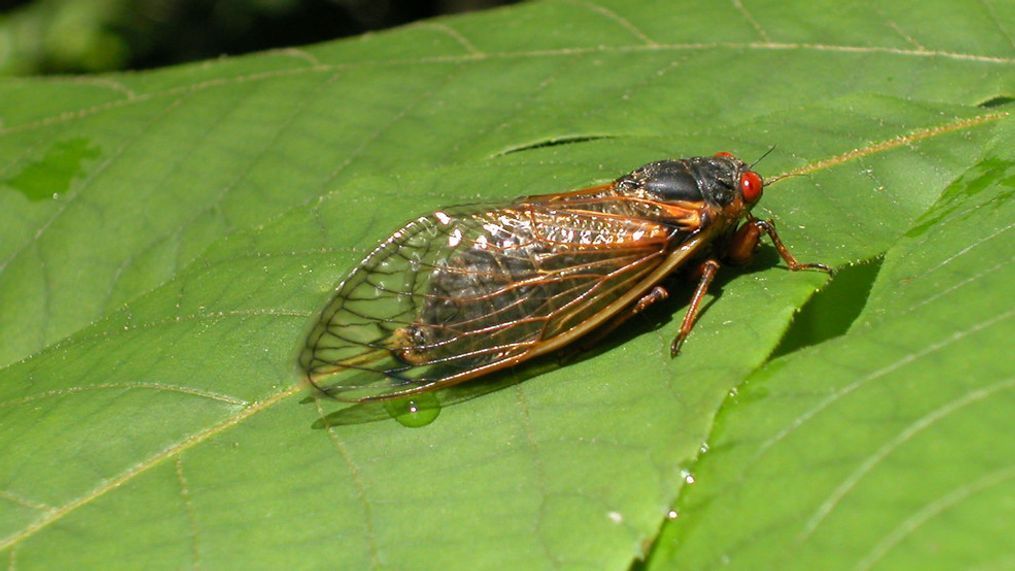'Going to be a delicacy': If you've ever wanted to eat a cicada, your time is coming
WASHINGTON (7News) — When you think of cicadas you might not think 'yum, I'd eat that!' But, if you were wondering, you can and many people do.
And with an influx of the 17-year bugs reappearing, it may just be the opportunity for you to try them for yourselves.
In fact, the University of Maryland has even put together an entire cookbook of recipes just for cicadas.
"Cicadas have one of the longest lifespans of any insects - termite queens are actually longer, they can live 20 years - but in terms of time underground, 17 or 13 years, as far as I know, is the longest period of development of any insect, the longest developmental period of any insect," Professor Michael J. Raupp says.
RELATED: How warming trends are changing where and when cicadas emerge
Raupp is a professor at the University of Maryland in the Entomology Department and runs his own website, 'Bug of the Week.' He is predicting there to be 1.3 million cicadas emerging per acre of land in the area.
"We're hoping people enjoy this, at least learn about [cicadas] before they panic and lock themselves up in their basement for 17 years," he said.
He says that people in the DMV region can look forward to seeing the bugs emerge over the next several weeks, adding that since the individual cicada's lifespan is typically two to four weeks, the bugs will likely be with us for six to eight weeks in total. By the Fourth of July, the cicadas will likely be gone, he says.
RELATED: Cicada swarms expected in May don't bite or sting, but could be harmful to your hearing
"They're safe to eat, I'll certainly be snacking on cicadas, there are many recipes," he said. "One of my favorites, of course, is the soft-shelled cicadas. Just after they mold, their skin is soft like a soft-shelled crab, and to me, that's a pretty good way to sample what a cicada tastes like."
Raupp says a good place to start is the cookbook written by Jenna Jadin and the University of Maryland 'Cicadamaniacs,' known as 'Cicada-licious,' which was written in 2004 and includes some "interesting recipes for preparing cicadas."
"They're going to be a delicacy, if you want to try to cicadas, check out Cicadalicious," he said. "You might find 'El Chirper Tacos,' I'm going to make some 'Emergence Cookies' this weekend, so it might be fun to try."
RELATED: 'Cicada-palooza' is coming. Maryland will be at the epicenter
He described the cookies as a "chocolate, chocolate chip cookie" that uses little cicada nymphs. In order to bake the bugs into the cookies, he recommends putting them in the freezer first.
You can eat the adults as well, but he recommends taking the wings and legs off first to avoid them from getting stuck in your teeth.
"Then you can wash them, you can blanch them, and put them in your recipes," he explained.
He adds that he doesn't understand people who find eating cicadas disgusting but eat food like oysters and clams.
"I wonder if you know what oysters and clams do for a living - they sit at the bottom of the bay filtering you know what out of the water, and I find it bizarre that somebody would eat that thing raw, but they wouldn't eat a cicada nymph that's been sucking on plant sap for 17 years," he said. "What is that about?"
RELATED: 'Need more powerhouse women in science': Meet the woman who turns cicadas, bugs into art
The professor adds that people can simply prepare the cicadas, you could cover them in chocolate, you could put them in a cookie, or season them in tacos.
"They're going to be pretty tasty like in a taco or in other dishes," he says.
For those adverse to what the bugs look like, he recommends mincing the bugs first.
"Once they've been blanched, if you're going to fry them, if it makes it easier and you don't want to stare into their tiny little faces, you could mince them up a little bit, I would fry them with seasonings just like anything else," he explains.
Humans wouldn't be the first ones to try the loud bugs as Raupp says red foxes, raccoons, and even golden retrievers have started to excavate the bugs. He adds that birds, reptiles, turtles, fish, squirrels, skunks, many species of ants, and decomposing insects will all take advantage of the bugs while they're here.
"Birds may be able to raise more young than in the past due to the influx of cicadas, squirrels are going to be fatter than ever, the fox has got a big smile on his face right now - so this is going to be a true bounty for all the other members of the food web a little bit higher up, a lot of things are going to eat cicadas this year," Raupp said.
"Once they're out, every creature in my neighborhood is going to want to eat cicadas, including me," Raupp said with a smile.
For more information or resources on cicadas or Professor Raupp, click here for the University of Maryland's cicada website.



